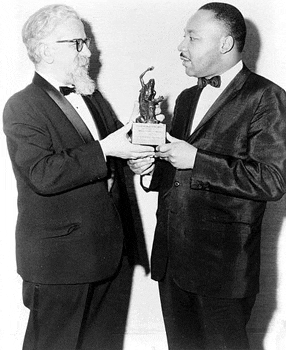Among my most precious mementos is a postcard sent by my mother on Tuesday, March 26, 1968. I was seven years old and with my grandfather while my parents attended an annual convention of rabbis. My mother wrote (using common terminology for the period),
Dear Dov,
Last night a very great man spoke to us. His name is Martin Luther King. He is a leader of the Negro people, and he wants to help them get a better life.
Love,
Ema and Abba
I understood working to help people achieve a better life, as my father was very active in local and Vermont state civil rights and social justice efforts.
Still, as a young white boy in a state with few people of color, I did not know who Rev. Dr. Martin Luther King, Jr. was, other than someone who addressed that convention.
I vividly remember sitting on my parents’ bed nine days later, listening for radio updates on his condition and finally hearing the awful announcement of his death.

Rabbi Heschel, my father’s seminary teacher, was a leading Jewish voice for civil rights, a foremost Jewish theologian and the person who introduced King at that convention. It is no small irony that King was murdered just a week before he was to attend the Jewish celebration of freedom.
With the approach of MLK Day, I am reflecting both on the Jewish scriptural reading for that weekend’s Sabbath and my mother’s brief postcard.
The designated portion for that Sabbath includes the Israelite’s crossing through the split water of the Sea of Reeds (often misleadingly rendered in English as the Red Sea).
In the biblical narrative, Pharaoh’s hardened heart appears to have been overcome as he finally allows the Israelites to leave.
But, shortly after their departure, Pharaoh’s heart hardens again as he sends troops after his fleeing ex-slaves, though they do narrowly escape through miraculous intervention.
It seems to me that the conviction of those advocating for non-violent protest in the civil rights movement of the sixties was that it would be the softening of hearts across the country which would ultimately bring their struggle success in the legal, political and social arenas.
However much (incomplete) improvement may have been achieved since then, many today with diverse political ideologies feel as if we again see a hardening of hearts and a rise in intolerance.
Our world is certainly not the world of a half-century ago. It never is. And it is natural to harden one’s own heart when we believe others have done so first.
But, while people should stand up for their beliefs, we will never truly achieve the better life we seek if we allow others to succeed in hardening our hearts.

 How to resolve AdBlock issue?
How to resolve AdBlock issue? 








